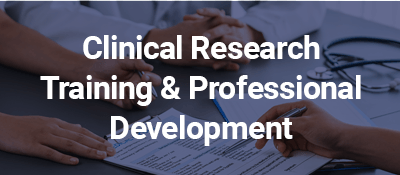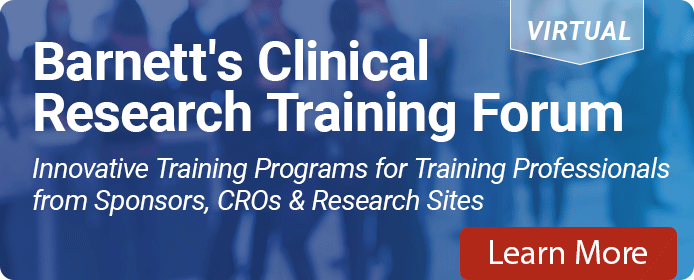Comprehensive Role-Based Training for Clinical Research Professionals
Barnett International's Core Curriculum courses are comprehensive role-based clinical research training programs designed to provide industry professionals with hands-on training in a dynamic virtual setting. Held four times a year during our “Clinical Research Training Weeks,” courses offer clinical research-focused, performance-based training and core competency development.
Comprehensive Monitoring for Medical Devices
Course Description
This course provides an in-depth overview of the medical device development process and the role of the Clinical Research Associate (CRA) in managing and monitoring medical device studies. This course is ideal for CRAs new to the device industry, as well as experienced CRAs who are transitioning from monitoring drug studies to monitoring device studies.
Learning Objectives
- Discuss the FDA regulations pertaining to clinical research and describe the ICH structure and function
- Define the common terms used in the field of device clinical research and identify the three ways devices are characterized
- Prepare and conduct a pre-investigation visit, an investigator’s meeting, an initiation visit, a periodic visit, and a closeout visit
- List the types of regulatory and study documents required for the sponsor and for the investigator
- List both the sponsor’s and investigator’s obligations as they relate to device accountability
- Describe the differences between adverse events, adverse device effects, and unanticipated adverse device effects
- Discuss the FDA inspection process and what can be learned from issues warning letters
Who Should Attend
- CRAs with one to two years of experience, and Engineers and other Device Industry Professionals responsible for the placement and monitoring of clinical trials, who want a practical, hands-on introduction to monitoring medical device studies according to Good Clinical Practice
Instructor
The course will be led by one of the following instructors:
Heather Marshall, M.S.N., B.S.N., R.N.
Shana Zink, B.S., C.C.R.A.
Click here for complete trainer biographies
Course Outline
Day One
- Introduction to the FDA and the Medical Device Approval Process: Introduction to the FDA; ICH overview; definitions; medical device regulatory processes
- US Good Clinical Practices: Concept of Good Clinical Practices; US GCP – sponsor, investigator and IRB obligations; overview of monitor’s responsibilities
- IRB Approval & Informed Consent Process: IRB application for approval; approval process – initial and ongoing; informed consent process and documentation; HIPAA authorization
- Pre-Study Processes: Determining the sponsor’s investigator/site needs; preinvestigation and confidentiality agreement; investigator/site selection; contracts/agreements; investigator’s meeting; initiation visit; recruitment and advertising
Day Two
- Study Documentation: Sponsor files; investigator files; source documentation; case report forms; communication
- Monitoring: Roles and responsibilities of the monitor during periodic visits; source document verification; case report form review in EDC; data retrieval and correction; document retrieval; protocol, investigational plan and GCP deviations; monitoring documentation
Day Three
- Device Accountability: Sponsor responsibilities as they relate to device accountability; investigator responsibilities as they relate to device accountability
- Close-out Visits: Reasons for a closeout visit; roles and responsibilities of the monitor during a closeout visit; investigator responsibilities after closeout
- Managing and Reporting Adverse Events: Adverse event terminology; variations in adverse event reporting and documentation; sponsor obligations relating to adverse event reporting; investigator obligations relating to adverse event reporting
- FDA Inspections: Purpose, types and mechanics of FDA inspections; common audit findings; FDA actions following an inspection; review of warning letters
Interactive Activities
- Monitoring Skills – Hands-On Simulation
- Monitor Group Discussions – Includes Case Studies for Monitor Visits, Device Accountability, Informed Consent Review, and Monitoring Priorities
- The Device Approval Process – Classifying Devices and Determining Pathways to Marketing
- Assessing Adverse Events
- Warning Letter Lessons Learned
Registration Fees
This course is for individual registrants only and does not allow for group training.
Special rates are available for multiple attendees from the same organization. Please contact Barnett Customer Service at +1 781.972.5400 or toll-free in the U.S. 800.856.2556 for more information. Or email Customer Service at: customer.service@barnettinternational.com.
Accreditation Information
Barnett International is accredited by the Accreditation Council for Pharmacy Education as a provider of continuing pharmacy education. Participants will receive 22.5 hours (2.25 CEUs) of continuing education credit for full participation, including the completion of a pre-test, post-test, and program evaluation. Barnett International will issue a receipt of completion for earned CEUs within three weeks of program completion. ACPE#: 0778-0000-23-028-L99-P. Released: 3/23.
Hold this course at your company! For more information, contact Naila Ganatra at +1 215.413.2471.
Upcoming Courses
This course will be offered from 12:00 p.m. - 7:00 p.m. Eastern
This course will be offered from 9:00 a.m. - 4:00 p.m. Eastern







